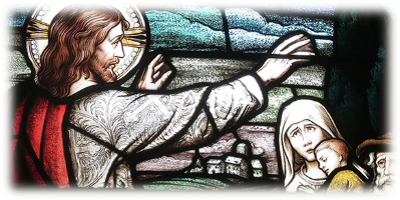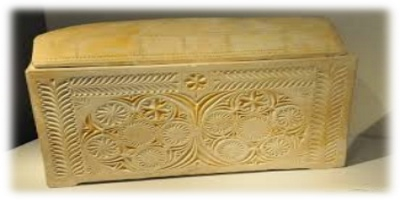And someone came to Him and said, "Teacher, what good thing shall I do that I may obtain eternal life?" And He said to him, "Why are you asking Me about what is good? There is only One who is good; but if you wish to enter into life, keep the commandments." Then he said to Him, "Which ones?" And Jesus said, "You shall not commit murder; You shall not commit adultery; You shall not steal; You shall not bear false witness; Honor your father and mother; and You shall love your neighbor as yourself." The young man said to Him, "All these things I have kept; what am I still lacking?" Jesus said to him, "If you wish to be complete, go and sell your possessions and give to the poor, and you will have treasure in heaven; and come, follow Me." But when the young man heard this statement, he went away grieving; for he was one who owned much property. And Jesus said to His disciples, "Truly I say to you, it is hard for a rich man to enter the kingdom of heaven. "Again I say to you, it is easier for a camel to go through the eye of a needle, than for a rich man to enter the kingdom of God." (Matthew 19:16-24 - NASB)
Yeshua's answer to the question "what must I do to obtain eternal life" is simply answered by "keep the commandments". Yeshua is clearly making the correlation between the commandments of Torah and life. Notice that the original question was about how to enter "eternal life," yet Yeshua states that by doing the commands, one will enter "life". The rich man believes that his life is complete and is now seeking for eternal life. Yeshua is pointing out to him that his life is not complete and he must focus on this life, not the life to come.
What is our life? Our life is defined by those things that we do and possess. We are recognized by our professions, cars, clothes, houses, etc. If we are successful in our profession and in obtaining great possessions, we are seen as having a "good and prosperous life". On the other hand, if we are not professionally successful and have very little in the way of possessions, we are seen as having a "poor life".
The rich man (i.e.: successful in profession and possessions) believes he has kept the commands and he may have, but is doing the commands enough? Yeshua tells him that if he wants to be "complete" he must sell all his possessions. The Hebrew word for complete is שלם (Sh.L.M, Strong's #7999), the root to the word שלום (shalom, Strong's #7965). One who is complete has shalom. Shalom is often misunderstood to mean simply "peace" but has a much wider application. One who has shalom has a complete life. Yeshua is implying that the rich man, while he believes his life is complete, is not complete because of his possessions and therefore lacks shalom. How do possessions inhibit shalom?
Look around the room you are in now. Take a close look at all of your "possessions" around you. Then take a walk around your house, garage and yard. All of these possessions are calling out to you for attention, whether it is reading, fishing, cleaning, watching, eating and a myriad of other things. Our culture has become a culture of consumers. We buy things to occupy our time or fulfill our needs. We spend more time maintaining our needs than we do enjoying life. We work for fifty weeks out of the year to maintain our many possessions so that we can take two weeks off and enjoy life away from our possessions.
Yeshua spoke about how we should view our life in Matthew 6:28-34.
"And why are you worried about clothing? Observe how the lilies of the field grow; they do not toil nor do they spin, yet I say to you that not even Solomon in all his glory clothed himself like one of these. But if God so clothes the grass of the field, which is alive today and tomorrow is thrown into the furnace, will He not much more clothe you? You of little faith! Do not worry then, saying, 'What will we eat?' or 'What will we drink?' or 'What will we wear for clothing?' For the Gentiles eagerly seek all these things; for your heavenly Father knows that you need all these things. But seek first His kingdom and His righteousness, and all these things will be added to you. So do not worry about tomorrow; for tomorrow will care for itself. Each day has enough trouble of its own.
What is really important in our life? Is it getting that bigger and better house? Getting another car? Moving up the corporate ladder in order to buy and maintain the house and car? Take a few moments and ponder on those things in your life that take you away from those things that should be of great important in your life and should be occupying your time. In our culture we do not have time to sit with our children or grandchildren and tell them stories or teach them about God because we are too busy with our possessions. Instead, we teach our children to rely on the same type of external things, such as toys and television, just as we do, causing a perpetuity of the problem. We do not visit with the sick or the elderly because we are too busy working or playing.
What kind of shalom can we expect to receive if we eliminated the need for all of our possessions. To be honest I really don't know because I have the same problem but I can tell you this, Yeshua knows about a life that is far better than the one we are living now, telling me that it must be worth striving for.
We can take an example from some of those in the Bible who literally walked with God such as Abraham, Jacob and Moses. These men, and others in the Bible had one thing in common. They were all nomads. Even Yeshua lived the life of a nomad as he traveled from village to village teaching the people. A nomad, out of necessity, was required to limit his possessions to a bare minimum. The absence of possessions facilitated more interaction with the family as well as with God.
In the very beginning of Yeshua's teaching, he recognized that the only thing that is good is "God" (Elohiym). This is not implying that all things are bad but, that all good things are part of God. In the ancient Hebrew mind, something that is good is something that functions properly. According to the commands of God our priority is about maintaining relationships in our family and neighbors. Do our possessions fulfill this function or detract from it? Can we look at our lives and say that it is good? When God created the world, he stated that it was good. It functioned in perfect harmony and balance. Can we say the same thing for the culture that we have created?

Like what you’re discovering? Continue the journey from Bible reader to translator.
|






